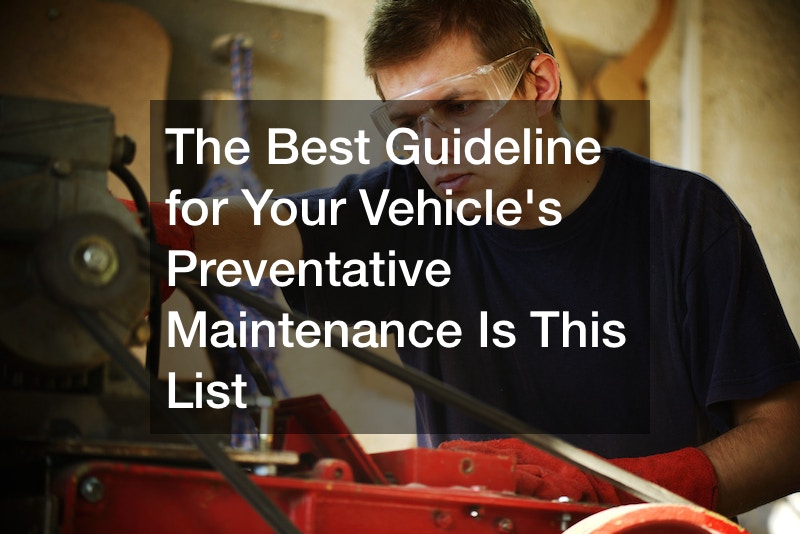So you just bought your new SUV and are incredibly delighted. It’s a huge milestone considering an SUV’s cost and benefits. But now, how do you make your new car last longer? First, your vehicle needs regular maintenance and repairs to keep it running smoothly and slow down the depreciation rate. This involves simple tasks like washing your car frequently and maintaining the air conditioning. Here are some tips to help you take care of your new SUV.
Go Through the Owner’s Manual

Many people don’t read the owner’s manual once they buy an SUV or any other product, and it’s no shocker. They don’t realize the owner’s manual has everything they need to take good care of their vehicle. Literally, anything that concerns your new car is in the manual. So, why not spare a few minutes to go through it and familiarize yourself with your vehicle?
But you might be wondering. “I already know this is an SUV, it has four wheels, a pair of headlights, and four tires. So why should I read the owner’s manual?” Believe it or not, the owner’s manual has got more information than you think. It’s not just the basic information that everyone knows.
The manual explains everything specific to your SUV. For instance, you’ll find details about the tire size, engine type, transmission, and other critical components. This information comes in handy during vehicle repairs, upgrades, and modifications.
What’s more, the owner’s manual has information about the warranty coverage offered by the manufacturer. It outlines what is covered by the manufacturer, the duration of the coverage, and specific requirements to keep the warranty valid. Also, you get a comprehensive maintenance schedule tailored to your vehicle’s specific needs. So don’t throw away the owner’s manual without going through it.
Clean Your SUV Regularly
Keeping your new SUV clean is a basic maintenance requirement. While most car owners focus on cleaning the car’s exterior, it’s still essential to clean the interior. And it’s not just about maintaining your vehicle’s appearance. Cleaning your SUV has a lot more benefits.
First, it protects your SUV against environmental elements. Dirt, bird droppings, and dust left unremoved, can damage your SUV’s paint over time. Moreover, road grime and salt can cause rust and corrosion on your SUV, especially on the undercarriage and metal components. Washing, therefore, prevents rusting and corrosion, prolonging your SUV’s life.
However, you should be careful when washing your new SUV. For instance, you should only use mild automotive soap and a soft sponge or microfiber to clean the vehicle. Using harsh household cleaners or abrasive materials can scratch the paint on your SUV.
Tire Care

Why do you think new vehicle models come with tire pressure monitoring systems (TPMS)? It’s because manufacturers know the importance of tire maintenance. Therefore, they are trying to help you take good care of your vehicle tires. Poor inflation and other maintenance issues may cause your SUV tires not to handle appropriately, increasing accident risks.
One of the primary benefits of proper tire care is to improve the tire’s life. For instance, proper tire inflation reduces wear on your tires, eliminating the need for premature replacement. Also, proper tire inflation increases fuel efficiency, thereby lowering carbon dioxide emissions.
Additionally, tires are the only part of your SUV in constant contact with the road. Therefore, they help maintain stability and traction while driving. So, proper tire care is vital for your safety on the road. You’ll have peace of mind on the road knowing that your tires are properly maintained.
So how do you take care of your SUV tires? First, regularly check tire pressures to ensure they are properly inflated. If your SUV has a tire pressure monitoring system, the better. Second, ensure proper tire alignment to prevent toed-in or toed-out misalignment, which may reduce fuel efficiency and increase tread wear. Also, don’t drive on your tires past their useful life, as this will risk your life (and that of your passengers). While tires are expensive, you can explore used tires for sale to find a perfect match for your SUV.
Check Fluid Levels
Your SUV requires various types of fluids to run smoothly. For instance, the engine oil lubricates the engine’s internal components, minimizes friction, and prevents wear between moving parts. Adequate engine oil contributes to optimum fuel efficiency, smoothing engine operation and prolonging your SUV’s life.
The coolant (another type of fluid in your SUV) absorbs and dissipates heat, regulating your SUV’s engine temperature. This prevents the engine from overheating or freezing in cold weather. The brake fluid maintains your SUV’s braking system’s efficiency and safety. The transmission fluid lubricates and cools the transmission’s moving parts, enabling smooth gear shifts and averting excessive friction and wear.
Each of these vehicle fluids must be kept at optimum levels to ensure smooth operation. Therefore, you should regularly check and replace your SUV’s fluids to ensure smooth operation. The check helps you detect and address any potential leaks in the vehicle’s systems, preventing fluid loss, component failures, and expensive repairs.
In addition to checking fluid levels, you should also monitor fluid quality for your new SUV. Fluids such as transmission fluid and engine oil degrade over time, losing their effectiveness. So, if you notice unusual odor, color, or particles in your vehicle fluid, have it checked and replaced by an experienced auto repair company.
Brake Maintenance

When it comes to safety, your SUV’s brakes are your first line of defense. And due to their active role in car stoppage, they tend to wear out more quickly, requiring a replacement. According to Oxmoor Toyota, you should change your car brakes every 20,000 miles. However, how often you replace your SUV’s brakes will depend on various factors, like your driving habits and road. Regardless, checking and replacing your SUV’s brakes is crucial when needed.
So, how do you keep your SUV’s brakes in good shape? First, schedule regular brake inspections with a professional mechanic. This professional will assess the condition of your SUV’s brake components and detect any signs of wear or damage. The auto repair mechanic will check the brake pads, brake calipers, brake fluid, brake rotors (discs), and brake lines, among other components.
Additionally, brake pads are designed to wear down over time. Worn brake pads reduce your SUV’s braking performance, compromising your ability to stop the vehicle. Therefore, you should consider regularly inspecting and replacing your vehicle’s brake pads. But how do you know your SUV’s brakes have worn down? When brake pads are nearing the end of their lifespan, they often emit a squealing noise. And in addition to this squealing noise, you’ll notice reduced braking efficiency.
Don’t Overload Your SUV
Your SUV is designed to carry a particular weight as specified in the manual. While you can exceed this recommended weight by a small margin, overloading your vehicle might not be ideal. For instance, when you overload your SUV, the center of gravity rises, causing the vehicle to lose stability. This makes it difficult to steer or brake. Also, when you overload your SUV, it takes longer to stop, increasing accident risks.
Overloading your SUV also puts a lot of strain on the tires, creating more friction. The increased friction produces a lot of heat that wears out tires rapidly. The heat could also cause blow-outs which may result in an accident. Moreover, you’ll lose traction, especially during cornering or emergency maneuvers.
Additionally, overloading increases your SUV’s overall weight. As a result, your vehicle will demand more power to accelerate and maintain speed. As a result, your SUV will burn more fuel, leading to reduced fuel efficiency. This also explains why overloaded vehicles don’t speed.
Overloading your SUV may also put excessive stress on various components, including brakes, suspension, chassis, and drivetrain. For instance, more weight on your suspension could cause it to sag or become permanently damaged. This will, in turn, impact your SUV’s ride comfort and handling. Also, an overloaded SUV requires more stopping power, leading to increased brake wear, reduced braking performance, and brake fade.
Keep the Air Conditioning System Maintained

Your new SUV most likely has a heating and air conditioning system to control the temperature and humidity in the vehicle. However, the system should be examined and maintained regularly to ensure comfortable rides. But what is the essence of maintaining your SUV’s air conditioning system?
First, the air conditioning system keeps your SUV’s interior cool and comfortable during hot weather. The system regulates temperature, minimizes humidity, and offers you and your passengers a pleasant environment. This ensures a comfortable driving experience. Regular maintenance helps uncover and address minor issues that could otherwise escalate into significant AC system failures. And you can’t afford to drive your SUV during the scorching weather without a functional air conditioning system.
A malfunctioning air conditioning system can reduce fuel economy. How? When temperatures inside your SUV rise and the AC isn’t working, your solution will be to open the windows to let in cool air. While this will work to regulate the hot temperatures, opening the windows will increase your new SUV’s drag. As a result, your car will use more fuel to move.
Give it a Paint Job
When buying your new SUV, you probably chose a perfect color matching your taste and preference. The factory paint job on your new vehicle is designed to protect its surface and give it an attractive appearance. Also, it’s durable and can withstand the elements for many years.
However, you can still seek additional painting services for your SUV. For instance, you can customize your car by opting for a new paint job. You may also paint your new SUV to match your specific theme and to make the vehicle stand out in a crowd.
Additionally, if your vehicle sustains significant paint damage due to scratches, fading, or accidents, you might need to repaint the affected areas. This will help restore the car’s appearance while protecting the underlying metal from rust. However, keep in mind that auto painting services can be expensive. What’s more, they can void your insurance.
Get Vehicle Insurance
While most states require all vehicle owners to have vehicle insurance, some may allow you to drive without insurance. However, it’s often recommended to buy insurance for your vehicle. Therefore, if you’ve just bought a new SUV, you might want to buy auto insurance. But why?
First, auto insurance provides financial protection in the event of an accident or other covered incidents. Think of this, you purchase your SUV today, and a week later, you get into an accident, or someone steals it. If you have insurance, the policy will cover the cost of repairing or replacing the vehicle. If not, you’ll have to pay for all the repairs and damages out of pocket, which might be costly.
Additionally, auto insurance includes liability coverage, which protects you from legal liabilities. This happens when you get into an accident that causes damage to other people’s property. Depending on your coverage, the insurance will cover medical expenses, property damage, and legal costs. Before buying insurance for your SUV, compare policies from various car insurance companies to find a perfect fit.
Also, if you have leased or financed your vehicle, your leasing company or lender will likely require you to have auto insurance. This is part of the agreement to protect their investment in the vehicle.
Check on Your Driving Habits
Lastly, you should adopt safe driving habits to prevent accident risks and ensure smooth vehicle operation. Remember, driving is also a risky endeavor and must be handled with care. So how do you drive your new SUV safely? First, always keep your eyes on the road. This involves keeping away anything that might distract you from driving, such as your phone.
Additionally, avoid excessive speeding and aggressive braking. These driving habits can put more strain on the brakes leading to premature wear. Always adhere to the recommended speed levels and follow all the traffic rules. This way, you’ll not only protect your vehicle but also prevent accidents and damages.
Your vehicle is a significant purchase, whether it’s new or you bought it through cash for cars. Therefore, you need to take good care of it to prevent damage, costly repairs, and legal liabilities. All the above measures will help you maintain your new SUV. Remember to drive safely and adhere to traffic rules. Happy driving.


